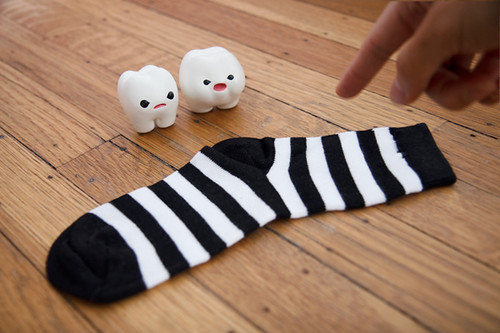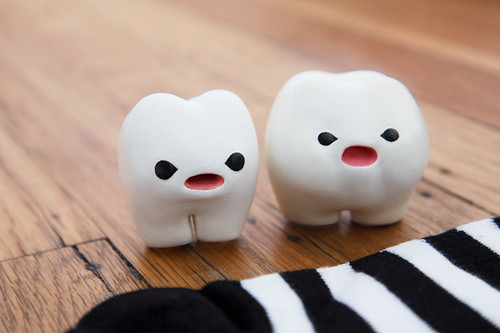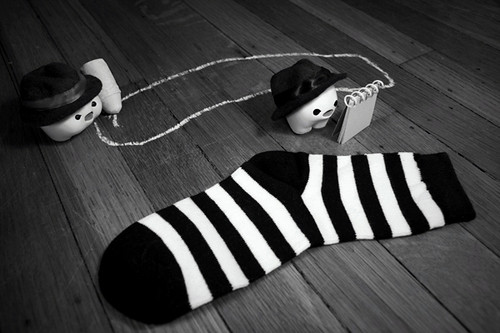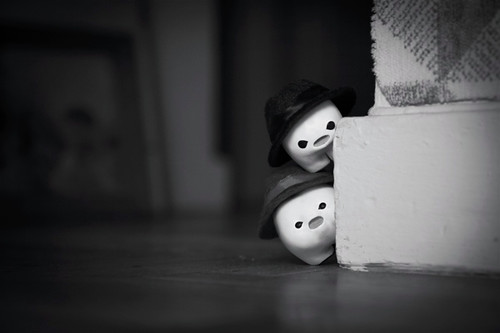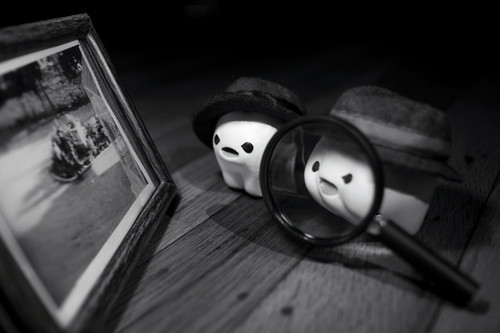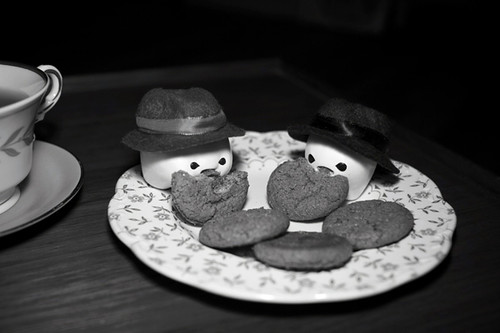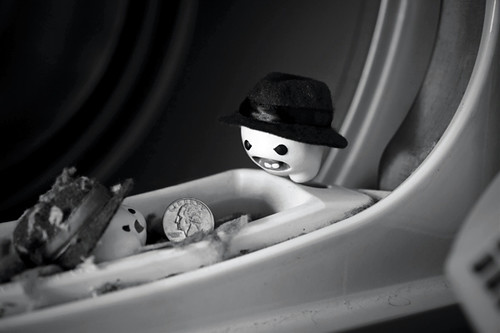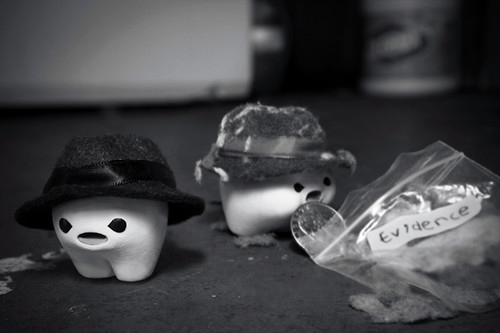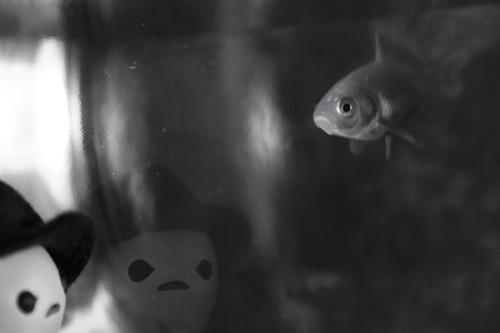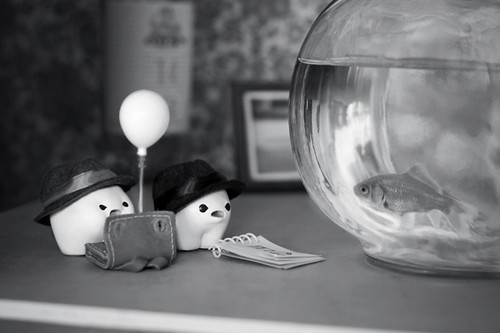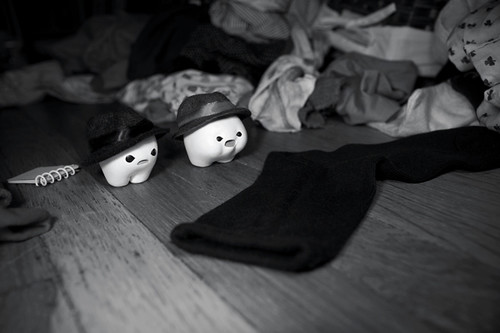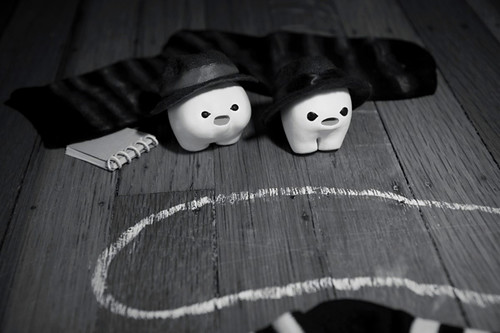Thursday, 13 December 2012
Wednesday, 5 December 2012
Toof Noir (From mymilktoof.blogspot.com)
As from what I understand about Film Noir being all detective, killing, betrayal and all, here is a story I extracted from the internet depicting Film Noir, but in a cute and fun way.
Toof Noir
Hey guys, have you seen my other sock?
"No, but..."
"We're on it."
"Don't worry Ma'am- We're professionals.
We'll find that sock, guaranteed."
"First we need to search for clues..."
"Hello clues, are you in here?
"Is that a clue?"
"These are clues we eat."
"Time to do some dirty work..."
"What do you see, Lardee?"
"A-ha! Money!"
"Bag up the evidence. This case is deeper than I expected."
"Sorry to pop in unannounced Carrot..."
"Have you seen this sock?"
"Not talking, eh?"
"What if we give you this?"
"How 'bout now?"
"Carrot is not very helpful."
"Freshly folded laundry - our last option."
"No dice."
"This is bad, Lardee. If we don't solve this case,
we're gonna lose all our street cred. What do we do?"
"Nobody will know the difference."
"Uh.... Guess what!
I think we found your..."
Oh hey guys, I was just going to tell you-
I found my other sock in the bathroom!
Thanks for looking!
"Quick Lardee, destroy the evidence."
"Another case solved!"
Understanding : Film Noir
“Between the Great Depression and the start of the
Cold War, Hollywood went noir, reflecting the worldly, weary, wised-up under
current of midcentury America. In classics such as Laura, Sweet Smell of
Success, and Double Indemnity, where the shadows of L.A. and New York pulse with
killers, corpses, and perilous romance, failure is not only a logical option but
a smart-talking seduction.” – Vanity Fair March 2007
Principally in film noir, it is the narrative and existential angst that drives a mostly male protagonist, who more often than not is the victim of a manipulative femme-fatale.
“Noir is premised on the audience’s need to see failure risked, courted, and sometimes won; the American dream becomes a nightmare, one strangely more seductive and euphoric than the optimism it repudiates… Noir provided losing with a mystique.”retrieved from : http://filmsnoir.net/what-is-film-noir#ixzz2EBluif2z
Wednesday, 17 October 2012
Creating my icon
Sorry this post came about late and way overdue, but its finally here..!
My step by step process on creating my icon.
I have chosen to portray my icon through clothes and adding pastel and neon elements to it.
I started out with a plain white t-shirt, and snipping off the sleeves to create a sleeveless top which are popular in the grunge scene.
(source of images unknown)
I then painted on the head of an unicorn with pastel pink and purple onto the shirt. I chose to paint a unicorn is because of the superheroes assignment we had in Creative Thinking Skills class in semester 1, that I was Ice Vendetta : The Unicorn Warrior. I thought it would be nice to relate what I've done previously to the present assignment. And because unicorns look really good in pastel colours.
When its drying up.. Also, in my opinion, to match something really princessy or "magical" in a way to the grunge style is something I find interesting and relates best to the style I'm trying to show.
The end product. I have also painted diamonds at the neck of the unicorn in black and neon pink, as well as droplets of inverted ice creams in earthy and neon colours.
Close up shots.
What I'm trying to say is that, my icon are made up of small little details but with a main element. As I picked a shirt to depict that, a shirt wouldn't be complete as a style on its own isn't it? So here are a few ways I would pair up my shirt in order to create the whole "style" or to complete my icon.
And there you have it, my icon as my style.
Monday, 8 October 2012
Research : Mask
Mask as a disguise : To amuse / terrify people
The word "person" derives from the Greek word "persona," that refers to the mask used by an actor to play a particular role. The persona, or the "mask" that we each wear, mediates between ourselves and society and between ourselves and the Other (whether you define "Other" as divinity, God or universal truth) and has done so since the beginning of human time. (x)
As some individuals might take advantage of the mask and use it as a form of disguise - to amuse or to terrify people, the mask acts as some sort of confidence booster in the form of "a layer" for them. Look at females who put on cosmetics for an instance, the kind of mask as a confidence booster are none other than their make-up. Some might not understand the reason behind females caking up on all the powder and gooey substances, it actually leads back to the voices of the society. All of those that we see, we hear and taste. It has become a kind of self-respect for some females to apply make-up just so they could live up to their standards of life or to live up to the expectation of the stereotypes that females has really sharp features..etc. But truth be told they are all disguised as something originally not.
Everyone has their own sets of masks regardless of how close to perfection others might think you are. We wear them throughout the day, change them if we need to just so we could match up to others' level of perception, then finally return back to ourselves only when we sleep. I think carrying and wearing all these "masks" that we have is a kind of way we try to protect ourselves. Otherwise, the consequences of letting our guard down from not adjusting to your masks when it comes to different audiences is too high. That is why I believe we have a significant amount of people attempt/commit suicide on a daily basis. Again, all these are concerning the society we live in. The more modernized we get, the more we expect from each other because nothing ever stays good enough. Its always more, more and more. And so, when our true self can't catch up with the demands, we simply put together a figure we ourself would be expecting from others, use and interact with them : the mask.
Back tracking to the history in disguising,
"Sorcerer of Trois Freres", an image engraved fifteen feet above the cave floor of Les Trois Freres in France from 13,000 BC. The Sorcerer of Trois Freres, by virtue of his disguise, created an elevated level of existence that contained himself, the animals and his audience. As his candlelit image flickered high above his Paleolithic audience, the Sorcerer and the animals may have moved as one, returning life to his prey, his prey lending their powerful image and instinctual wisdom to him.
With these examples from early history we find that uses of the mask were many, including the mediation of a personal or societal relationship with the universal, evoking spirits of fertility and utilizing an aspect of the goddess deity for protection and prosperity. Throughout later history, mask-making was employed the world over.
The masks of the First Nations People of the Pacific Northwest reflect a kinship between the owner of the mask and his or her clan’s ancestral animal spirit.
In its quietest moment a mask has the potential to transform. When the wearer dons the mask he or she ceases to be a private individual. Instead, the living energy that is brought to the mask combines with the spirit of the mask and both are transformed, that is, the spirit of the mask is embodied and the wearer of the mask is enlivened with spirit.
(x)The adaption of the mask nowadays are often related to one fooling ourselves. Where the tradition seems to have masks as a tool for ritual practices or cultural dances, the people nowadays wear this invisible masks just to set out a positive/negative impression onto another party.
"We are so used to disguising ourselves from others that we end up disguising ourselves from ourselves."
– François La Rochefoucauld
Mask as a model of a human head or face/head of an animal
"A mask. Masks were worn by Greek and Roman actors in nearly all dramatic representations. This custom arose undoubtedly from the practice of smearing the face with certain juices and colours, and of appearing in disguise, at the festivals of Bacchus. Now as the Greek drama arose out of these festivals, it is highly probable that some mode of disguising the face was as old as the drama itself. Choerilus of Samos, however, is said to have been the first who introduced regular masks. Other writers attribute the invention of masks to Thesuis or Aeschylus, though the latter had probably only the merit of perfecting and completing the whole theatrical apparatus and costume. Some masks covered, like the masks of modern times, only the face, but they appear more generally to have covered the whole head down to the shoulders, for we always find the hair belonging to a mask described as being a part of it; and this must have been the case in tragedy more especially, as it was necessary to make the head correspond to the stature of an actor, which was heightened by the cothurnus. The annexed cut represents the grotesque mask of a Satyr, together with a tragic mask, which are contined in the British Museum. some of the oldest manuscripts of Terence contain representations of Roman masks, and from these manuscripts they have been copied in several modern editions of that poet. The cut annexed contains representations of four of these masks prefixed to the Andria." — Smith, 1873
Mask as a pretense : To hide one's true character or feeling
If the world has justified that a certain expression is right and a certain expression is wrong, then what happens to the people that believes otherwise and strive for acceptance and a stand in the society is that they turn to their "masks". Its the only way they could feel the existence they long for even if it takes for them to suppress their true character and/or feelings. Thats the beauty of the mask. It provides you a good standing if you wear them right, but it also mean that you would have to hide what you have to say, hence displaying the perfect theory of "there's no such thing as free lunch".
_________________________________________________________________________________
Well, its up to different individuals to see and think about a "mask". Be it in a tangible or non tangible form, its really up to us how we decide to portray our idea of understanding.
Stay tuned to my next post regarding the "type" of mask I chose to portray and create to further enhance the importance and functions of our mask(s) in our lives.
Friday, 14 September 2012
Exploring : The term "ICON"
icon |ˈīˌkän|
noun
a painting of Jesus Christ or another holy figure, typically in a traditional style on wood, venerated and used as an aid to devotion in the Byzantine and other Eastern Churches.
• a person or thing regarded as a representative symbol of something: this iron-jawed icon of American manhood.
• Computing a symbol or graphic representation on a video display terminal of a program, option, or window, esp. one of several for selection.
• Linguistics a sign whose form directly reflects the thing it signifies, for example, the word snarl pronounced in a snarling way.
ORIGIN mid 16th cent. (in the sense [simile] ): via Latin from Greekeikōn ‘likeness, image.’ Current senses date from the mid 19th cent. onward.
iconography |ˌīkəˈnägrəfē|
noun
1 ( pl. -phies) the use or study of images or symbols in visual arts.
• the visual images, symbols, or modes of representation collectivelyassociated with a person, cult, or movement : the iconography of pop culture.
2 the illustration of a subject by drawings or figures.
• a collection of illustrations or portraits.
DERIVATIVES
iconographer |-fər| noun
iconographic |īˌkänəˈgrafik| adjective
iconographical |īˌkänəˈgrafikəl| adjective
iconographically |īˌkänəˈgrafik(ə)lē| adverb
ORIGIN early 17th cent. (denoting a drawing or plan): from Greekeikonographia ‘sketch, description,’ from eikōn ‘likeness’ + -graphia ‘writing.’
As humans, with or without religious beliefs we're all bound to come across icons, be it in the form of images, posters, large scaled painting, or statues (monuments). Every religion has a similarity whereby they have their own distinctive icons. Up till now we do acknowledge the existence of icons, but what we're missing here is the understanding towards it, towards the background and for some may argue, the purposes. It has to be there for some reason, and one of it serves as a visual interpretation of what you could 'expect' from that belief.
As I go deep into exploring the term "Icon" I basically went a long way understanding the background to it, the history, from when where and how it came about to using it as a way of communication in some icons found in some religion. My researches are internet based and through a book on "Icon Painting by John Taylor). But going through all what seems endless, pages of history on iconography, I came to realise that it all started with the very basics : turning the belief into a form of visual.
Pope Gregory I : "Painting is used in churches, that they who are ignorant of letters may at least read on the walls by seeing what they cannot read in books . . . To adore a picture is one thing, but to learn, through the story of the picture, what is to be adored, is another."
One particular piece of icon painting in Christianity that I came across in the book by John Taylor is the Crucifixion, Venetian, 14th century.
If I weren't a christian myself, I would have understood the whole situation at that time by looking at the painting. So in another sense, the painting communicates even to those who are completely unaware of the story behind a story.
So I've mentioned in my previous post on Dr Martens boots, I would have to be able to enhance the essence of myself into an icon, regardless of it being in 3-dimensional or 2-dimensional, in order to make those who are interested in my work have another level of understanding of who I am or what to expect from me. Since I'm all about "style is what makes you shine", this brings me into researching about a style I like : Pastel Grunge.
Grunge is a subculture in the 90's, mainly consisting of shagged appearance. The theme I'm interested in is the incorporation of pastel into the grunge scene. Where harsh edges are twisted with some gentle elements.
Here are a few photos I've found from a magazine by Topshop (An apparel store originated from the UK) that carries the elements of pastel grunge in the form of clothings and jewelry, that I will be using as a reference for the outcome of my icon.
Subscribe to:
Comments (Atom)
![[ S C I E N C E o f J U P I T E R ]](https://blogger.googleusercontent.com/img/b/R29vZ2xl/AVvXsEhWadwi0qgj79wzBZOTZH13izUjLHy0c8LUuMyfer2BErnQPaMLBfslyaHDfaoL3L5DvH5WMYE-Whdna_3Nuuo1zj9GFM8tgWhdo7Rn5Z-joDNEFMY4LSv-9ZoVtq7r0R6a_SQpo58-x6U/s1600/sofskyscraper.jpg)
